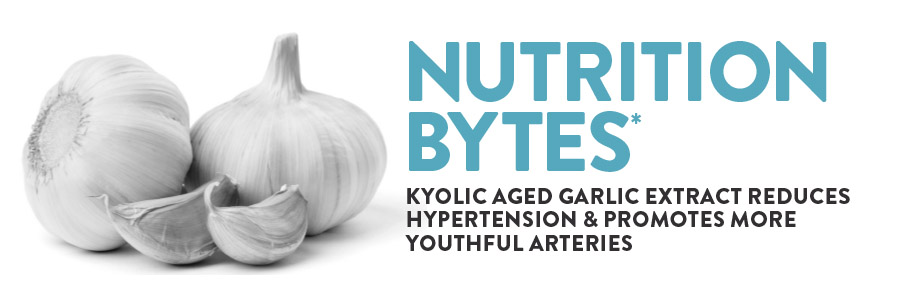


Sign-up for {N}power to get exclusive discounts, newsletters, members-only features, and more!
 Denver - Design District - Alameda and Broadway
Denver - Design District - Alameda and Broadway
368 S Broadway
Denver, CO 80209
United States
 Preferred Store:
Select a Store
Preferred Store:
Select a Store

It is estimated that 1 out of every 3 adults age 20 and older has hypertension (i.e., high blood pressure) in the U.S. Of these adults, less than half have their hypertension controlled. Increasing prevalence of hypertension remains an important public health concern due to its direct link to increased risk for cardiovascular disease, particularly stroke, heart attack, and heart failure, and due to this, current research has placed emphasis on identifying effective therapies for the management of hypertension.

A 2018 study conducted by researchers at the National Institute of Integrative Medicine found Kyolic Aged Garlic Extract (AGE) to be a powerful supplement for reducing blood pressure (BP) in adults aged 50-70 years with uncontrolled hypertension. This double blind, randomized, placebo-controlled trial involved 49 participants who were assigned to receive either two capsules of Kyolic AGE (600 mg each, for a total of 1.2 g of AGE) or placebo for 12 weeks. Results of the study revealed that three months of AGE supplementation significantly reduced systolic and diastolic BP. Measures of arterial stiff ness were also significantly improved. According to the researchers, improvements observed in arterial stiff ness were equivalent to five years of arterial age reversal. Compared to placebo, researchers also observed greater decreases in inflammatory markers in the treatment group, in addition to increased gut microbiota diversity, however, these results were not statistically significant.
Due to the average blood pressure reduction observed in this study, researchers concluded that the use of Kyolic AGE is comparable to conventional blood pressure drug therapies, reducing the risk of cardiovascular events such as heart attack or stroke by 30-40 percent.

Statins are one of the most widely prescribed pharmaceuticals in the U.S., with millions of people taking these cholesterol-lowering drugs. But as the prevalence of statin use has increased, so have the concerns for side effects. Recent research has found that statin use, especially long-term use, significantly increases the risk of developing diabetes and problematic skin infections.
The study, published in the British Journal of Clinical Pharmacology in late 2019, investigated whether statins increased the risk of skin and soft tissue infections (SSTIs), specifically staph infections, and diabetes. Researchers reviewed data from the Australian Department of Veterans Affairs to determine the relationship between statins and SSTIs; statins and diabetes; and diabetes and SSTIs, as well as whether statins increased the risk of SSTIs independent of diabetes. The researchers found a significant association between statins, diabetes risk, and risk of SSTIs in patients within 91 days of starting statin therapy. Their analysis revealed that statins were associated with a significant risk of skin infections, in both nondiabetic and diabetic statin users, as well as a significant risk of new onset diabetes.
Statins have been shown to inhibit specific T regulatory immune cells within four to 12 weeks of use, which may increase susceptibility to infections and may explain the increased risk of SSTIs among statin users. The researchers wrote, “Regardless of the actual mechanism(s), it would seem prudent for clinicians to monitor blood glucose levels of statin users who are predisposed to diabetes, and be mindful of possible increased SSTI risks in such patients.”



Sign-up for {N}power to get exclusive discounts, newsletters, members-only features, and more!
